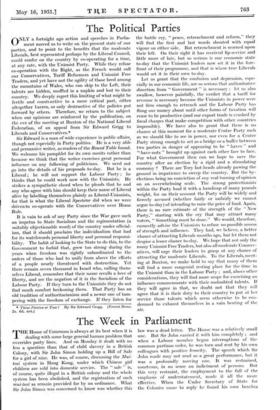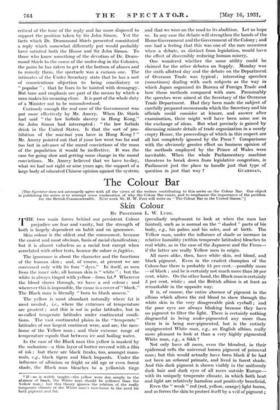The Week in Parliament
THE House of Commons is always at its best when it is dealing with some large general human problem that overrides party lines: And on Monday it dealt with no less a question than that of child slavery in a British Colony, with Sir John Simon holding up a Bill of Sale for a girl of nine. He was, of course, discussing the Mui- tsai system in Hong Kong, under which Chinese girl children are sold into domestic service. The " sale " is, of course, quite illegal in a British colony and the whole system has been abolished, and the registration of such mui-tsai as remain provided for by an ordinance. . What Sir John Simon was concerned to know was whether this law was a dead letter. The House was a relatively small one. But Sir John carried it with him completely ; and when a Labour member began interruptions of the common partizan order, he was torn and rent by his own colleagues with positive ferocity. The speech which Sir John made may not read as a great performance, but it was a profoundly moving one. It was restrained, courteous, in no sense an indictment of persons. But this very restraint, the employment to the full of the emphasis of understatement, made it all the more effective. When the Under Secretary of State for the Colonies came to reply he found his own benches critical of the tone of the reply and far more disposed to support the position taken by Sir John Simon. Yet the facts which Dr. Drummond Shiels presented constituted a reply which somewhat differently put would probably- have satisfied both the House and Sir John Simon. To those who know something of the devotion of Dr. Drum- mond Shiels to the cause of the under-dog in the Colonies, the pains he has taken to get at the bottom of abuses and to remedy them, the spectacle was a curious one. The intimates of the Under Secretary state that he has a sort of conscientious objection to being conciliatory or " popular " ; that he fears to be tainted with demagogy. But tone and emphasis are part of the means by which a man makes his meaning clear. It is part of the whole duty of a Minister not to be misunderstood.
Curiously enough the real case of the Government was put more effectively by Mr. .Amery. When Dr. Shiels had said " the law forbids slavery in Hong Kong,", Sir John Simon had interrupted : " the law forbids drink in the United States. Is that the sort of pro- hibition of the mui-tsai you have in Hong Kong ? ". Mr. Amery pointed out that if your law went too far and too fast in advance of the moral convictions of the mass of the population it would be ineffective. It was the case for going slow and getting some change in the moral convictions. Mr. Amery believed that we have to-day,. what we had not eight or nine years ago, the support of a large body of educated Chinese opinion against the system;• and that we were on the road to its abolition. Let us hope so. In any case the debate will strengthen the hands of the Home Government- and the Government of the Colony ; and one had a feeling that this was one of the rare occasions when a debate, as distinct from legislation, would have the effect of discernibly reducing human misery.
One wondered whether the same utility could be claimed for the other debates on Supply. Monday was the sixth allotted day and the debate on the Department, of Overseas Trade was typical ; interesting speeches, (sometimes) dealing with such subjects as the way in which Japan organized its Bureau of Foreign Trade and- how those methods compared with ours. Presumably the speeches were aimed at the Secretary of the Overseas, Trade Department. Had they been made the subject of carefully prepared memoranda which the Secretary and his officials could consider at leisure, and answer after examination, there might well have been some use in the exchange of ideas. But what precisely is, gained by discussing minute details of trade organization in a nearly empty House, the proceedings of which in this respect are all but completely ignored by the Press ? Comparisons with the obviously greater effect on business opinion of the methods employed by the Prince of Wales were inevitable. When the whole Parliamentary machine threatens to break down from legislative congestion, is Parliament just the place to handle just that type of question in just that way ? GUARDIAN.



















































 Previous page
Previous page